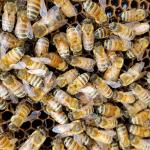 This conference brings together stakeholders with shared concerns about pollinator health, habitat, and their future success and prosperity in Massachusetts and New England. Snow date: March 3, 2020.
This conference brings together stakeholders with shared concerns about pollinator health, habitat, and their future success and prosperity in Massachusetts and New England. Snow date: March 3, 2020.
UMass Extension's Landscape, Nursery, and Urban Forestry Program seeks to encourage communication between Green Industry professionals including landscapers, land managers, arborists, licensed pesticide applicators, and other landscape practitioners with professional beekeepers, researchers, and state officials who share the common goal of maintaining and encouraging pollinator health in Massachusetts. The goal of this shared day of education is not only to hear about the latest research, but also to encourage further networking between diverse groups of stakeholders who share at least one common interest: pollinator protection.
Topics to include native bees and pollinators, a review of steps applicators can take to reduce unintended negative impacts on these insects, management of residential yards and other urban green spaces for native bee habitat, recent research looking at the impact of sunflower pollen on diseases of pollinators, and the top 10 most practical actions you can take to protect our pollinators.
Pesticide & Professional Credits
4 pesticide contact hours for categories 29, 37, 36, 48, and Applicators License.
Association credits: 3.5 CFE (cat 2), 4.25 ISA, 4 SAF, 1 MCH, 2 MCA, and 2 MCLP.
Registration
To register using a credit card, go to https://umasscafe.irisregistration.com/Form/pollinators2020
To register paying by check or purchase order, print out and use this registration form.
The cost is $95/$86 per person for three or more registrations from the same company (10% discount). Morning coffee will be provided; lunch is on your own.
Agenda
(Snow Date: Mar. 3, 2020)
| 8:30 AM | Registration |
| 9:00 AM |
Introduction to the Bees This presentation will discuss common native bees in Massachusetts: species ID, life cycles, nesting habits, and preferred habitat. The ability to identify these insects and knowledge of their habits and life cycle aids land managers seeking to preserve these species. |
| 10:00 AM |
Bee-ing More Aware About Pesticide Use Interest and activity in urban beekeeping has increased dramatically over the past decade with more honey bee hives managed in Massachusetts than ever before. As responsible applicators, land managers, and stewards of the environment, it is important to broaden your awareness about beekeeping and honey bee health. We’ll learn the latest updates on local and national trends in honey bee health, beekeeping in the Commonwealth, and review steps applicators can take to reduce unintended negative impacts. Insight will also be shared concerning the role MDAR’s Apiary and Pesticide Enforcement Programs play in investigating incidences of bee kills suspected from pesticide mis-use. |
| 10:50 AM | Break (coffee provided) |
| 11:15 AM |
Backyard Habitats for the Bees Management of residential yards and other urban green spaces for native bee habitat, with a focus on lawn management. Research in 6 US cities that investigated the responses of native bees to different management regimes, including residential yards and protected parks, will also be discussed. |
| 12:10 PM | Lunch (on your own) |
| 1:15 PM |
Plants, Pollinators, and Pathogens: How Plants Can Treat or Spread Disease We all know flowers are important food for pollinators, but did you know that nectar and pollen chemicals can help bees fight off some diseases? Flowers are also places where pollinators can share diseases, just like people sharing germs in a classroom. Dr. Lynn Adler will present her research on both the medicinal and nutritional benefits of some plants but also the potential for certain species to spread disease. |
| 2:15 PM |
Panel Discussion: Bee Conservation in Massachusetts and New England - The Top 10 Most Important Practical Actions You Can Take to Protect Our Pollinators Anne Averill, Kim Skyrm, Susannah Lerman, and Lynn Adler This panel discussion will allow land managers, green industry practitioners, and beekeepers to hear from our speakers about the top 10 most important practical actions they can take to protect our pollinators. This opportunity should allow for an in-depth look at these practices, as well as allow the audience to share good experiences and challenges they face in their daily work with our speakers. |
| 3:15 PM | Credits and Adjourn |